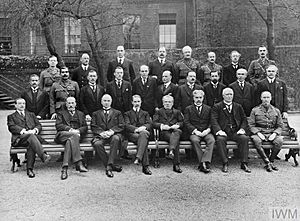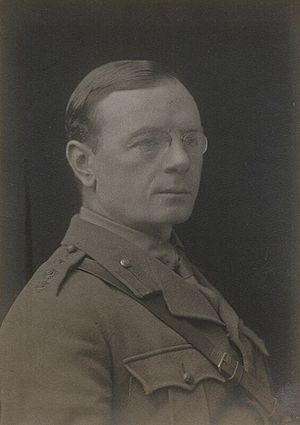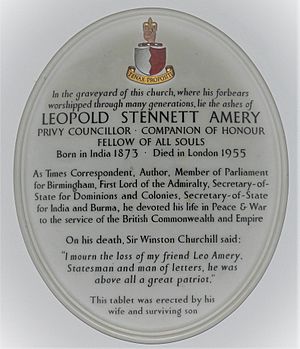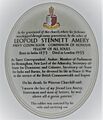Leo Amery facts for kids
Quick facts for kids
Leo Amery
|
|
|---|---|
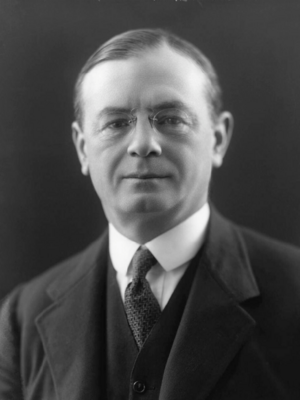 |
|
| First Lord of the Admiralty | |
| In office 31 October 1922 – 28 January 1924 |
|
| Monarch | George V |
| Prime Minister | |
| Preceded by | The Lord Lee of Fareham |
| Succeeded by | The Lord Chelmsford |
| Secretary of State for the Colonies | |
| In office 6 November 1924 – 4 June 1929 |
|
| Monarch | George V |
| Prime Minister | Stanley Baldwin |
| Preceded by | J. H. Thomas |
| Succeeded by | The Lord Passfield |
| Secretary of State for India and Burma | |
| In office 13 May 1940 – 26 July 1945 |
|
| Monarch | George VI |
| Prime Minister | Winston Churchill |
| Preceded by | The Lord Zetland |
| Succeeded by | The Lord Pethick-Lawrence |
| Personal details | |
| Born |
Leopold Charles Maurice Stennett Amery
22 November 1873 Gorakhpur, North-Western Provinces, British India |
| Died | 16 September 1955 (aged 81) London, England |
| Political party | Conservative |
| Education | Harrow School |
| Alma mater | |
| Occupation | Politician and journalist |
Leopold Charles Maurice Stennett Amery (1873–1955) was a British politician and journalist. He was also known as L. S. Amery. He belonged to the Conservative Party.
Amery was very interested in making sure Britain's military was strong. He also cared a lot about British India and the British Empire. He was against the idea of "appeasement," which meant giving in to aggressive countries to avoid war.
He is especially remembered for a powerful speech he gave in the House of Commons in May 1940. In this speech, he strongly criticized the Prime Minister, Neville Chamberlain. Many people believe his speech helped lead to Chamberlain stepping down. After this, Winston Churchill became the new Prime Minister.
Contents
Early Life and Education
Leopold Amery was born in Gorakhpur, British India. His father was English, and his mother had Hungarian Jewish roots. His father worked for the Indian Forestry Commission. In 1877, his mother moved back to England.
In 1887, Amery attended Harrow School. He was a classmate of Winston Churchill there. Amery was very good at his studies and also enjoyed gymnastics.
After Harrow, he went to Balliol College at Oxford University. He did very well in his studies, especially in classics. He could speak many languages, including Hindi, French, German, and Turkish.
Journalism Career
During the Second Boer War, Amery worked as a reporter for The Times newspaper. He wrote articles that criticized the British commander, which helped lead to the commander being removed. Amery was one of the few reporters who visited the Boer forces. He even almost got captured with Winston Churchill.
Later, Amery edited and wrote much of The Times History of the South African War. This was a seven-volume book series about the war.
In 1903, he wrote a book called The Problem of the Army. In this book, he suggested ways to improve the British Army. He also wrote articles against free trade, arguing that Britain needed to protect its own industries.
Beginning Political Career
Amery decided to focus on politics. He turned down offers to be an editor for major newspapers.
In 1908, he tried to become a Member of Parliament (MP) but lost by a very small number of votes. In 1911, he ran again and won, becoming an MP for Birmingham South. He was a strong supporter of tariff reform, which meant putting taxes on imported goods to protect local businesses.
Role in the First World War
During the First World War, Amery used his knowledge of the Hungarian language to work as an intelligence officer. He helped in the Balkans campaign.
Later, he worked for Prime Minister David Lloyd George's government. He helped rewrite the Balfour Declaration, which supported a Jewish homeland in Palestine. He also encouraged the creation of the Jewish Legion for the British Army.
Amery did not like the idea of the League of Nations. He believed that not all countries were equal, so giving them all equal voting rights was not a good idea.
First Lord of the Admiralty
After the war, Amery was elected as an MP for Birmingham Sparkbrook. From 1922 to 1924, he served as First Lord of the Admiralty. This meant he was in charge of the Royal Navy.
During his time, the Washington Naval Treaty was signed. This treaty reduced the size of the Royal Navy. Amery defended the plan to fund the Singapore Naval Base, even though some people disagreed.
Colonial Secretary Role
From 1924 to 1929, Amery was the Colonial Secretary. In this role, he was responsible for Britain's colonies around the world.
He expanded the team of experts who advised on economic, medical, and agricultural matters in the colonies. He also set up the Empire Marketing Board to promote trade within the British Empire.
Amery hoped to turn some colonies, like Kenya and Palestine, into self-governing areas similar to dominions. However, strong opposition from local populations stopped these plans.
Out of Office
In 1931, Amery was not included in the new National Government. He remained an MP but joined the boards of several large companies. He needed to do this because he didn't have much personal wealth.
He became a director for companies like the British Southern Railway and Marks and Spencer. His work with German metal companies gave him a good understanding of Germany's military strength. He even met with Adolf Hitler and other European leaders.
Later Political Career
Opposing Appeasement
In the 1930s, Amery was a strong critic of "appeasement," which was the policy of trying to avoid war by giving in to Germany's demands. He often spoke out against his own party's leaders.
He believed Britain needed to spend more on its military. He also wanted a new, high-level government position to plan Britain's overall defense strategy. He thought he or Churchill should get this job. When a less experienced person was given the role, he was disappointed.
Amery was against working with the Soviet Union against Germany because he was always against communism.
When Prime Minister Chamberlain announced his trip to Munich to sign an agreement with Hitler, Amery was one of only a few MPs who did not cheer.
Amery also hoped to form an alliance with Italy to counter Germany's growing power. He felt that Britain's decision to put economic penalties on Italy for invading Ethiopia pushed Italy closer to Germany.
Second World War Actions
Amery is famous for two dramatic moments in the House of Commons during the early part of the Second World War.
On September 2, 1939, Prime Minister Chamberlain suggested he would not declare war on Germany immediately after its invasion of Poland. Amery was very angry. When the Labour Party leader's stand-in, Arthur Greenwood, said he was speaking for Labour, Amery famously shouted, "Speak for England, Arthur!" This implied that Chamberlain was not doing so.
The second incident happened during the Norway Debate in 1940. After news of several military failures, Amery gave a powerful speech criticizing Chamberlain's government. He ended by quoting Oliver Cromwell: "You have sat too long here for any good you have been doing. Depart, I say, and let us have done with you. In the name of God, go!" This speech helped lead to Chamberlain's government falling and Winston Churchill becoming Prime Minister.
Secretary of State for India and Burma
During Winston Churchill's wartime government, Amery became Secretary of State for India. This was despite the fact that he and Churchill often disagreed about India's future. Amery was determined to do his best in the role. He often felt frustrated by Churchill's strong opinions on India.
Amery was against holding an investigation into the 1943 Bengal famine, fearing the political impact. However, an investigation was held in 1944.
Final Years
In the 1945 general election, Amery lost his seat in Parliament. He was offered a special title (a peerage) but turned it down. He did not want it to stop his son, Julian Amery, from having a political career in the House of Commons later on. He was made a Companion of Honour, a special award.
In his retirement, Amery wrote a three-volume autobiography called My Political Life. He passed away in 1955.
Legacy and Beliefs
Throughout his career, Amery strongly believed in the unity of the British Empire. He saw the Empire as a force for good in the world. He supported the idea of colonies like India slowly becoming independent nations. He wanted these nations to stay connected to Britain through trade, defense, and shared pride in the Empire.
Amery was very active in imperial affairs in the 1920s and 1930s. He was in charge of colonial relations from 1924 to 1929. He also helped organize a large event celebrating the Empire in 1936.
He was suspicious of the United States' intentions regarding the British Empire. He wanted Britain and its dominions to trade mostly with each other, behind a common tariff barrier. He hoped the Labour government elected in 1945 would continue to support this "Imperial Preference" trade system.
Personal Life
Amery was a well-known sportsman, especially as a mountaineer. He continued to climb mountains, even into his sixties. He climbed in the Swiss Alps, Bavaria, and the Canadian Rockies, where Mount Amery is named after him. He also enjoyed skiing.
In 1910, Amery married Florence Greenwood. They had two sons.
Their elder son, John Amery (1912–1945), made propaganda broadcasts from Germany during the Second World War. He died in 1945. His father later changed his entry in Who's Who to say he had "one s[on]".
Amery's younger son, Julian Amery (1919–1996), served in the Royal Air Force and British Army during the war. He later became a Conservative politician himself.
Leopold Amery is buried in the churchyard of St John the Baptist in Lustleigh, his father's home village. There is also a special plaque inside the church to remember him.
Images for kids
 | Charles R. Drew |
 | Benjamin Banneker |
 | Jane C. Wright |
 | Roger Arliner Young |


